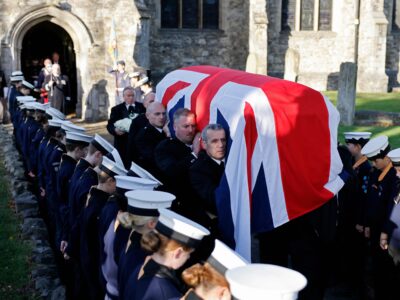
Alleged terrorist who killed David Amess tells court he wanted to be a martyr and regrets ‘nothing’
The alleged terrorist who killed Sir David Amess has told a court that he wanted to become a “martyr” and regrets nothing.
Ali Harbi Ali, 26, said he believed the Conservative politician deserved to die because he had been among more than 200 MPs who voted for airstrikes against Isis in Syria and Iraq.
“I decided to do it because I felt that if I could kill someone who had made decisions to kill Muslims, it could prevent further harm to Muslims,” he told the Old Bailey.
“He won’t be able to vote again in parliament, he won’t be able to do votes like that in future. [I wanted to] send a message to his colleagues who have done similar things. Something like that will always have a response.”
Mr Ali said that he expected to be shot by armed police and become a “martyr”, but dropped his knife after realising the officers who initially responded did not have guns.
“I expected bang bang bang, I thought they would start shooting,” he told the jury.
Mr Ali wore a black shirt while giving evidence and delivered his comments calmly and dispassionately.
Asked whether he regretted killing Sir David or any of his other actions, he replied “nothing” and added: “I don’t feel any shame.”
Mr Ali said that in 2014 he had decided he wanted to travel to Isis territories in Syria or Iraq, where he could “help” or fight for the terrorist group.
But the court heard that the defendant, then aged 18, was reported to the Prevent counter-extremism programme by his school and was visited by police.
Mr Ali said he heard nothing further after going to a session with a mentor and then “kept schtum” about his intentions and views on Syria.
He told the jury that it became too difficult to make the journey because police were “suspicious” that years and lots of arrests were being made.
The defendant said he changed his plans and decided to focus on an attack in the UK after Isis lost territory and it became “very difficult to get in contact with people to try and go there”.
“I decided that if I couldn’t make hijrah to help the Muslims by going there, I would do something here instead,” Mr Ali said.
The court previously heard that he had researched several other MPs, walked around outside the houses of parliament and made reconnaissance trips to a constituency surgery of Mike Freer MP and to the home address of Michael Gove.
Mr Ali said that on some of those occasions he was carrying the knife he later used to murder Sir David in his bag.
“When I had the rucksack I would have been planning to do something,” he added.
When asked by prosecutor Tom Little QC whether he would have killed an MP if he had the opportunity on those occasions, he replied: “Not just any MP, the ones who voted in those motions to carry out attacks on Muslims in 2014 and 2015.”
He gave evidence at the Old Bailey on Tuesday after the trial was postponed when the judge and jurors tested positive for Covid.
The trial previously heard how the defendant had carried out extensive research on Mr Gove and written a planning document with ideas of how to attack him while he was jogging, or during his journey home.
Mr Little said that he decided against attacking Mr Gove after learning that he had split up from his wife and the house had been sold.
On 15 October, he travelled to Leigh-on-Sea after booking an appointment at Sir David’s constituency surgery while posing as a local resident.
He attended the event at Belfairs Methodist Church, which the MP had advertised on Twitter, and launched the knife attack after sending out a WhatsApp message stating his intentions.
Mr Ali told the court that he had first drafted the message in 2019. In it, he claimed the attack was “for the sake of Allah” and apologised to his family for deceiving them, before listing a range of supposed justifications.
A video claiming to show destruction by the US-led coalition’s bombing campaign in Isis’ former capital of Raqqa was attached to the message.
Mr Ali said it would have been “smarter to send it straight to the news or Twitter or something like that” rather than his family and friends, because he wanted to “get my message out”.
Mr Little told the defendant that at the point he launched the brutal attack, Sir David was trying to help him.
“Because it was his surgery, I mean I guess yes,” Mr Ali replied. “I killed him because he harmed Muslims, if he’s trying to help me after doing that it doesn’t really matter.”
He said he regarded Sir David as an “enemy” because of his votes on airstrikes and his membership of the Conservative Friends of Israel group.
The court heard that during police interviews, Mr Ali suggested that he also hoped the attack would make Shamima Begum and other Isis members detained in Syria “happy”.
He said that if Isis claimed responsibility for the attack, he “would have been fine with that” and conceded that his actions aligned with the group’s calls for supporters to carry out lone terror attacks if they were unable to travel to its territories.
The defendant denies murder and preparing acts of terrorism. Mr Justice Sweeney adjourned the trial until Monday, when he will sum up the facts of the case before the jury retires.
Source: Independent





